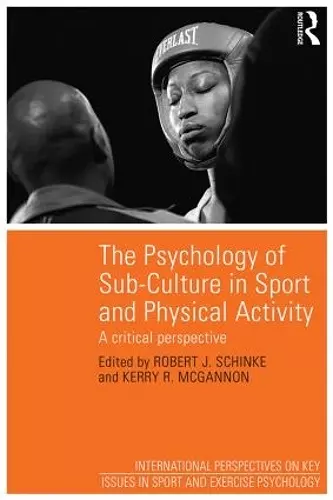The Psychology of Sub-Culture in Sport and Physical Activity
Critical perspectives
Robert J Schinke editor Kerry R McGannon editor
Format:Paperback
Publisher:Taylor & Francis Ltd
Published:20th Aug '14
Currently unavailable, and unfortunately no date known when it will be back
This paperback is available in another edition too:
- Hardback£150.00(9781848721579)

International Perspectives on Key Issues in Sport and Exercise Psychology is a series of edited books, with a global focus, which reflect the state of art in areas of current and emerging interest in the study of sport and exercise psychology. Each volume in the series contributes to the better understanding of a key issue facing researchers and practitioners in sport psychology.
This volume in the series focuses upon the sociocultural issues that challenge and often undermine participation, performance, and well-being in sports. Contributors address a number of important issues, such as exclusion, miscommunication, and ineffective practice in sport. The book extends the recent interest in culture within sport psychology by using a critical approach to highlight less mainstream sports such as martial arts, circus arts, extreme sports, and dance, and it will help sports participants and social scientists to gain an understanding of these marginalized sporting identities. By highlighting "subcultural" contexts, with their individual practices and values, it is hoped that the volume will promote the goal of achieving a more just, inclusive, and ethical sport psychology.
The Psychology of Sub-Culture in Sport and Physical Activity will be ideal reading for sport and exercise academics and practitioners, advanced students of applied sport psychology, and related fields such as sport science, critical studies, sociology, cultural studies and social anthropology.
'An interesting resource for a graduate seminar in sport psychology or sport studies, this book accomplishes the task of pushing research in the domain of sport psychology into areas that are typically not examined. The book will also help scholars interested in research that challenges the traditional positivistic approach and utilizes critical analysis in the area of sport psychology. Summing Up: Recommended. Graduate students, researchers, faculty, professionals.' -L.J. Burton, University of Connecticut, in CHOICE, April 2015
‘Human beings evolved to become an intensely social species. Our nervous systems (and the behaviours, thoughts, and emotions that arise from them) grow, get damaged, and become healed all within cultural and subcultural (e.g., family, sport, community) contexts. Mainstream sport and exercise psychology has traditionally had a primary focus on individuals, as if mental health, psychological disorders, and performance are athlete-centred issues. Schinke and McGannon, in this highly informative book, have assembled a fine group of authors who show us how socially and culturally bound our lives are and how no one (e.g., athlete, coach, researcher, practitioner) is an island, but rather we are situated on complex continents with many countries, regions, cities, and villages that all shape who we become’.- Mark Andersen, Professor of Sport Psychology, College of Sport and Exercise Science, Victoria University, Australia
‘The Psychology of Sub-Culture in Sport and Physical Activity presents a collection of articles on important and crucial issues untouched by conventional and traditional approaches in sport psychology. The use of critical narrative approaches to capture the cognitions, behavior and feelings of athletes, together with the utilization of reflections and reflexivity in practice, has encouraged me to think critically about my own research interests, methodologies, and practices . . . I strongly recommend the book to sport psychology researchers, practitioners, and students who wish to enhance their knowledge and skills, and use them for the benefit of those who need them.’ - Gershon Tenenbaum, Benjamin S. Bloom Professor of Educational Psychology, Florida State University, USA
‘Human beings evolved to become an intensely social species. Our nervous systems (and the behaviours, thoughts, and emotions that arise from them) grow, get damaged, and become healed all within cultural and subcultural (e.g., family, sport, community) contexts. Mainstream sport and exercise psychology has traditionally had a primary focus on individuals, as if mental health, psychological disorders, and performance are athlete-centred issues. Schinke and McGannon, in this highly informative book, have assembled a fine group of authors who show us how socially and culturally bound our lives are and how no one (e.g., athlete, coach, researcher, practitioner) is an island, but rather we are situated on complex continents with many countries, regions, cities, and villages that all shape who we become’.- Mark Andersen, Professor of Sport Psychology, College of Sport and Exercise Science, Victoria University, Australia
‘The Psychology of Sub-Culture in Sport and Physical Activity presents a collection of articles on important and crucial issues untouched by conventional and traditional approaches in sport psychology. The use of critical narrative approaches to capture the cognitions, behavior and feelings of athletes, together with the utilization of reflections and reflexivity in practice, has encouraged me to think critically about my own research interests, methodologies, and practices . . . I strongly recommend the book to sport psychology researchers, practitioners, and students who wish to enhance their knowledge and skills, and use them for the benefit of those who need them.’ - Gershon Tenenbaum, Benjamin S. Bloom Professor of Educational Psychology, Florida State University, USA
ISBN: 9781848721586
Dimensions: unknown
Weight: 317g
214 pages